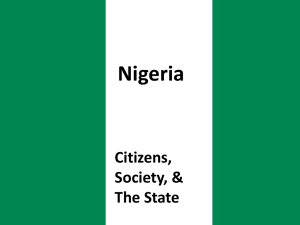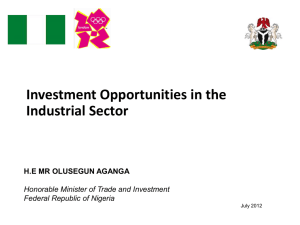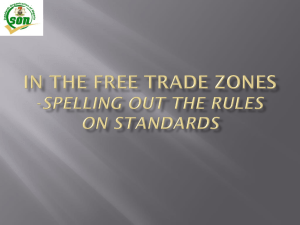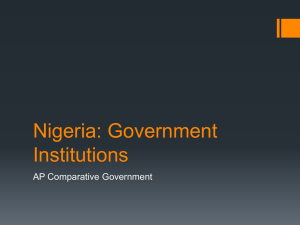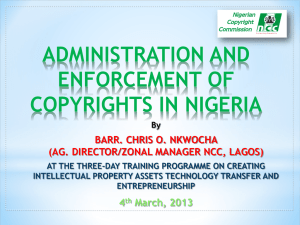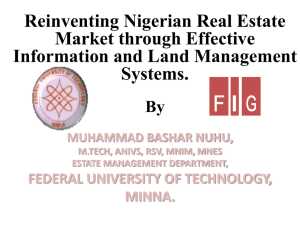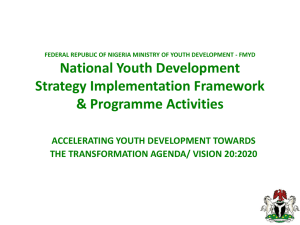As promised, here are some suggested topics for your essay
advertisement
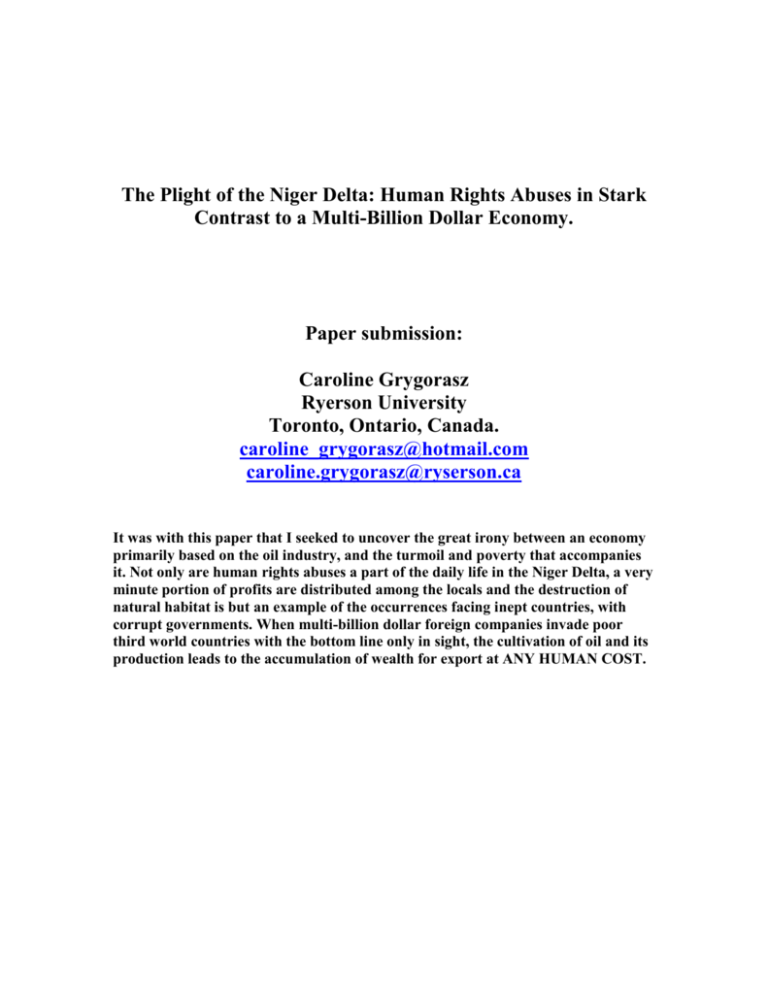
The Plight of the Niger Delta: Human Rights Abuses in Stark Contrast to a Multi-Billion Dollar Economy. Paper submission: Caroline Grygorasz Ryerson University Toronto, Ontario, Canada. caroline_grygorasz@hotmail.com caroline.grygorasz@ryserson.ca It was with this paper that I seeked to uncover the great irony between an economy primarily based on the oil industry, and the turmoil and poverty that accompanies it. Not only are human rights abuses a part of the daily life in the Niger Delta, a very minute portion of profits are distributed among the locals and the destruction of natural habitat is but an example of the occurrences facing inept countries, with corrupt governments. When multi-billion dollar foreign companies invade poor third world countries with the bottom line only in sight, the cultivation of oil and its production leads to the accumulation of wealth for export at ANY HUMAN COST. The Plight of the Niger Delta: Human Rights Abuses in Stark Contrast to a Multi-Billion Dollar Economy. Introduction In times of economic prosperity, coupled with the immeasurable supply of oil, it would be expected that the quality of life would only ameliorate progressively in Nigeria, more specifically the Niger Delta. The realities of the people living in this oil-saturated country are far from being adequate. They are harsh, destitute, and burning with desire for change. As the multi-billion dollar economy has shown its prominence, it has also left a trail of disparity and extreme poverty amongst the vast majority of locals who can only watch as political leaders and foreigners tap into the millions that their land produces. The civilian population, especially the ethnic group of the Ogoni people, have experienced severe environmental and health degradation due to petroleum extraction, yet when these groups have attempted to protest these injustices, they have been met with repressive measures by Nigerian government and military forces. As a result, strife and deterioration in this region continues as only the elite few reap the benefits of the oil, leaving the greater part of the population of 144 000 000 to survive in conditions unimaginable to the Western world. As Nigeria declared its independence in 1960 from the United Kingdom after decades of colonial rule, the road to democracy had been interrupted several times by military dictatorships that seized the country in several staged coup d’etats. This paper will bring to the forefront the incredible imbalances between the relentless, productive economy, and the human rights abuses that the population faces in order to feed the demand for oil in the global markets. In Nigeria’s petroleum-based economy, the revenues have been squandered through corruption and mismanagement, and the institutionalizing of democracy has lead to extensive human rights abuses and injustices as well as social and environmental degradation. Background of Nigeria’s Economic Strengths The oil and gas industry has indisputably assumed the dominant role in the nation’s economic prosperity, and has succeeded in securing its position and necessity in international markets. It is considered to be the fifth largest world exporter of crude oil, based on bulk reserves concentrated in the Niger Delta and others found in various provinces. As the production of oil took on a greater importance, the once sole economy of agriculture was abandoned to pave the way for the extraction of oil. Nigeria was historically a large exporter of cocoa, maize, rice, yams, peanuts, bananas, sugar cane, cotton, rubber, and dairy products. “Consequently, agriculture and other non-oil sector, which at 1962 contributed 78.2 percent of the nation's revenue, dropped drastically to 1.1 percent in 1977, while crude oil contribution rose from 13.3 percent to 98.9 percent over the same period”, (Olusakin 5). With the extensive loss of production in the agricultural sector, Nigeria had become a large importer of foods. Along with the loss of agricultural exports, there was an exponential decline of labor needs, thus leaving many without a stable means of income. As the Nigerian government failed to implement the diversification of the economy away from its overdependence on the capital-intensive oil sector, it paved the way for the ultimate reliance on the unpredictable industry. It abandoned the fundamental principles of human rights, leaving many of those who were once capable of surviving on the means produced from agricultural yields, in complete and obsolete poverty. As large corporations began to dominate the Nigerian oil market, there was little to no room for competition. Money began to speak louder than any human rights activists. Poverty Among Riches “Poverty and all the related problems that are the inevitable by-products of all forms of hatred and discrimination, serve the interests of people with wealth and power” (Class notes, Mod 8). It denies its victims the fundamental human rights, such as water, food, clothing and shelter that are needed for basic survival. As the elite Nigerian minority persists in wealth and abundance at the expense of the poorer majority, the marginal gap becomes larger and larger. In order for some to sustain wealth, others perpetually live in absolute poverty. “Poverty in Nigeria becomes more evident when a distortion becomes so pronounced that people, groups and countries lose their capacity to adapt, change and survive peacefully”, (Olusakin 8). The oil industry has created such a distortion, leaving only a select few reaping its benefits. It is also crucial to note that all those living in poverty have been extorted to the point that foreign investors and oil companies generate incredible amounts of wealth at their very expense. This is also evident in the lives of the many Nigerians who risk their lives to tap gas pipelines that pass through their communities and steal fuel to sell in order to make some money. Not only do they risk arrest, conversely, many have died in explosions they caused trying to transport volatile gas. Understanding poverty and identifying the poor is not a simple task because there is no universal definition of poverty. Poverty is complex and multi-dimensional, and has various perceptions. “It is experienced differently by men and by women and can differ according to geographical area, social group, and political or economic context” (Olusakin 6). Although such abundance in natural resources may aid in boosting social spending, there remains an ever-greater task to improve the quality of life, bringing the bare necessities of survival to a standard minimum. “The majority of Nigerians are suffering from abject poverty despite the huge amount of oil money accruing to the nation every day” (Olusakin 5). Poverty denies victims the most basic needs for survival, and is considered a breach in fundamental human rights. It leaves the people claiming entitlements that have continually been dismissed by the provincial as well as federal governments, leaving only a trail of poverty and despair. Such key elements of survival as clean drinking water, food, clothing, basic sanitation, shelter, basic health and educational services are yet to be structurally implemented, and financially supported. Fiscal prosperity clearly secures much wealth and abundance for some, yet the majority continues to thrive in unimaginable conditions. “Ironically, communities living in the oilproducing areas in the south of Nigeria, popularly referred to as the Niger Delta, are among the poorest group in the country” (Olusakin 10). The Niger Delta has for some years been the site of major confrontations between the people who live there and the Nigerian government security forces, resulting in extra-judicial executions, arbitrary detentions, and ruthless restrictions on the rights to freedom of expression, association, and assembly. “Violations of civil and political rights have been committed principally in response to protests about the activities of the multinational companies that produce Nigeria’s oil”, (Human rights Watch 1). Cases for Human Rights International human rights, as set out in the Universal Declaration of Human Rights and related documents include “the right to a decent standard of living, safe and well paid work, the right to decent housing and other rights that have been characterized as social and economic in nature”, (class notes mod 1). An abundance of economic prosperity would be thought to have the power to uphold and project the majority of such basic social needs, yet as can be derived form the experiences of the Nigerian population, it is far from the case. Oil-rich Nigeria, long hobbled by political instability, corruption, inadequate infrastructure, and poor macroeconomic management has been plagued by the powerful consequences of leaders, as well as tribal chiefs who have done nothing more than squander the vast amounts of money, leaving the destitute people empty handed. Abuses are also taking place against the Ogoni people, a minority group inhabiting the oil-producing region of Rivers State. They have protested the destruction of their land and culture by multinational oil companies and Nigerian military forces. As a result, countless Ogonis have been killed in attacks believed to be sanctioned by government authorities. Although human rights violations in Nigeria have been commonplace under military rule, 1993 was a particularly challenging year for Nigerian human rights groups. “Former President General Ibrahim Babangida annulled the results of a presidential election, which would have brought the country back to civilian rule, and installed an interim government. Later that year, Defense Minister General Sani Abacha forced the interim government to resign, effectively staging the seventh coup d’etat since Nigeria's independence” (Sakah 1). The regime banned all political meetings and associations, thus impeding discussions for the return to civilian rule. Also, it is imperative to mention that Human rights abuses during this time were widespread, including ethnically-based attacks, killing of demonstrators, detentions of activists and journalists, and interference with freedom of expression and association. The Nigerian press, known for being outspoken, came under even more fire from government authorities during the political crisis, and the government elected to close down several magazine houses. Environmental Degradation The main strength of the Nigerian oil industry is the abundance of both proven and undiscovered reserves of high quality oil which can be exploited at relatively low cost compared with other major oil producers. Yet as the sights are set high for the production and distribution of oil, there is a significant lack of attention being directed at creating a sustainable environment not only for local populations, nevertheless for the ecosystems that the Delta encompasses. “The international communities who import the nation's oil have criticized Nigeria and the oil industry for their negative environmental track records”, (Olusakin 12). Such aspects as well blowouts, flaring, rupturing in pipelines, instrumentation failures and sabotage have all contributed to the destruction and degradation of the natural environment. Soil degradation; rapid deforestation; urban air and water pollution; desertification; oil pollution of water, air, and soil; damage from oil spills; loss of arable land; rapid urbanization, are some the countless environmental issues facing Nigeria today as a result of the massive oil extraction and refinement. Human Rights Watch argues that “many of the cases investigated by Human Rights Watch which have led to security force abuses concern claims that oil companies have not abided by environmental standards or provided compensation in accordance with the law for damage resulting from oil exploration and production”, (5). The Niger Delta is home to one of the world’s largest wetlands. As the development of oil has irrevocably damaged the ecosystem, it is a continuous problem. Yet in contrast, “the oil companies operating in Nigeria maintain that their activities are conducted laws, in most respects comparable to their international equivalents, are poorly enforced”, (World Law 9). Corruption and Deceit In yet another scope, the history of political strife and societal imbalance in Nigeria has had a major effect on the ways in which political corruption and extortion has taken form. It is necessary to gain an understanding and appreciation of the complex character and dimensions of what actually constitute human rights and their violations in the postcolonial Nigerian polity. “In the political history of Nigeria conflicts have been between the major ethnic groups whose elites dominate national politics, in contemporary times they are between politically powerless minority groups and the federal government”, (Ejobowah 2). It is inevitable that those who lack the fiscal resources lack the ability to have their voices heard or have changes implemented. Our class notes stated that “ever increasing profits depend on and are created by the existence of a large group of people who are so impoverished and deprived - so exploited and oppressed - that they will accept conditions that the wealthy and powerful would never accept”, (8). Among undue hardships and without the hopes of a better life, the people continue to survive with what little they have. According to World Law, “corruption has manifested mainly in the form of bribery and embezzlement of public funds” (1). It has stolen the futures of those who should have rightfully reaped the benefits of a prosperous economy: the citizens. In response to global accusation of being one of the most corrupt nations in the world, the Nigerian government has implemented “the corrupt Practices Act 2000, which establishes a statutory body answerable to the National Assembly, and whose main purpose is fighting corruption”, (World Law 3). The Commission accomplishes its goals by “devising efficient and transparent systems and procedures, and by educating the public on and against bribery, corruption and related offences”, (World Law 3). It is said that the corruption must first be fought within the minds of the people, if it is to be fought on the larger scale societal front. Corporation Vs Population It is also crucial to mention the relations between the oil companies in the Niger Delta with the locals who suffer from the very existence of such corporations. “Many local people seemed to be the object of repression simply for putting forth an interpretation of a compensation agreement, or for seeking effective compensation for land ruined or livelihood lost”, (Human Rights Watch 2). It is almost difficult to believe that after years of extracting oil from the Nigerian reserves, many giant oil corporations have given nothing in return to the people. Not only have they dominated their living environments, they have continually bombarded the people with enormous forms of societal and environmental degradation. “After 20 years of oil exploration, Shell has only built one road (Chasa/Mogho/Bodo) and awarded 96 secondary school scholarships. Although the meager compensations paid for land acquisition and oil spillage have aided a few Ogonis to erect buildings and health centers, the people as a community have not felt any improved standard of living”, (Osaghae 1). Many isolated clashes between oil producing communities and oil companies have come to light over the last several years. Osaghae states that specific issues arose such as “neglect, failure to employ indigenes, and compensation, the main regressive mechanisms for oil-producing communities in their demand for improved conditions and better treatment have been petitions and delegations to the federal and state governments as well as the oil companies”, (8). In direct response to the violations and the brutal methods by which the local people were being treated by the oil corporations, as well as their provincial governments, Kenule Saro-Wiwa came to be the head of the MOSOP (Movement of the Survival of the Ogoni People). Kretzmann states that MOSOP has campaigned against what it calls Shell's "environmental terrorism" of the Ogoni homeland in southeastern Nigeria”, (1). It is noteworthy to mention that he campaigned for human and environmental rights in direct retaliation against the corrupt and powerful forces that be seeded him. His life came to a brutal and suspicious end, when he was detained by government officials, and tried on bogus charges of murder. “Saro-Wiwa and eight other MOSOP activists were hanged by the military government for the murders of four traditional leaders in the Niger Delta, after a trial before a tribunal which blatantly violated international standards of due process and produced no credible evidence that he or the others were involved in the killings for which they were convicted”, (Human Rights Watch 8). His death manifested the embodiment of Human Rights abuses, and brought them to the international forefront. Conclusion In a country where basic human needs, social spending, and legitimate government leadership is dominated by the consuming grip of the oil industry, much more is needed to infiltrate the social structures in order to provide a clean slate upon which the Nigerian people may one day attempt build their lives. As is evident from the conclusions drawn in this paper, there are several key bones of contention that must be addressed. Not only are Human Rights being violated, they have been for over a half century. The scars burned into the minds of the people will take generations to heal. Issues pertaining to the economy, poverty, human rights violations, environmental degradation, corruption, as well as the volatile relations between the locals and corporations must be kept at the forefront of governmental scrutiny. As the concepts listed above need further consideration, it is imperative that the international community acquires a stronger threshold on the situation in order help cleanse the country of its plagues. The Nigerian society is stained from the very substance that once held great moral and economic promise. “We can't defeat exploitation without also defeating oppression. These issues are not distinct. Rather, they are one and the same”, (Class notes, Mod 8). References Chic, Jacquie. “Class Notes: Module 1”. Ryerson University Blackboard. January, 2007. Chic, Jacquie. “Class Notes: Module 8”. Ryerson University Blackboard, March 3, 2007. Ejobowah, John Boye. "Who Owns the Oil? The Politics of Ethnicity in the Niger Delta of Nigeria." Africa Today 47.1 (Winter 2000): 28. Expanded Academic ASAP. Thomson Gale. Ryerson University. Kretzmann, Steve. "Nigeria's "drilling fields." (Shell Petroleum Development Co.'s support to the repressive regime in Nigeria) (Multinationals and Human Rights)." Multinational Monitor 16.n1-2 (Jan-Feb 1995): 8(5). Expanded Academic ASAP. Thomson Gale. Ryerson University. Mahmudd Sakah. "The failed transition to civilian rule in Nigeria: its implications for democracy and human rights. (Challenges to Democracy)(Africa Rights Monitor)." Africa Today 40.n4 (Fall 1993): 87(9). Expanded Academic ASAP. Thomson Gale. Ryerson University Olusakin, Ayoka Mopelola. "Peace in the Niger Delta: economic development and the politics of dependence on oil." International Journal on World Peace 23.2 (June 2006): 3(32). Expanded Academic ASAP. Thomson Gale. Ryerson University. Osaghae, Eghosa E. "The Ogoni uprising: oil politics, minority agitation and the future of the Nigerian state." African Affairs 94.n376 (July 1995): 325(20). Expanded Academic ASAP. Thomson Gale. Ryerson University. 13 Mar. 2007. “Correspondents Reports”. World Law. November 3, 2000. http://jurist.law.pitt.edu/world/nigeriacor2.htm “ The Price of Oil: Corporate Responsibility and Human Rights Violations in Nigeria’s Oil Producing Communities”. Human Rights Watch. January 1999. http://www.hrw.org/reports/1999/nigeria/index.htm#TopOfPage.
